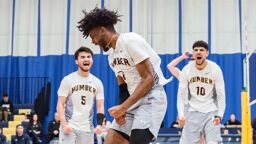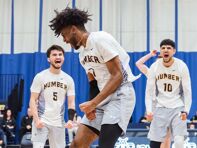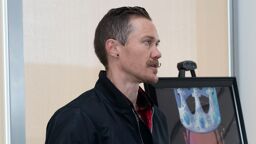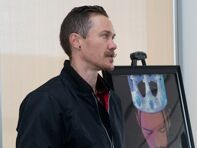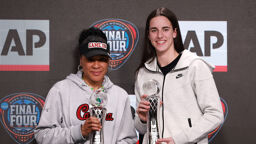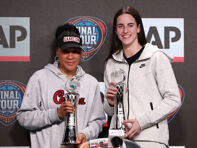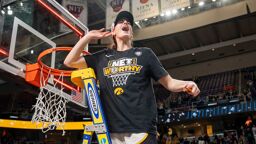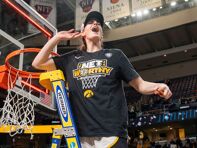Ohio State Buckeyes athletic director Gene Smith last week appeared in a You Can Play video produced by the school's hockey team (watch the video below). Smith, who is now the A.D. at his fourth school, has made acceptance of all athletes and coaches — including those who are gay, lesbian, bisexual and transgender — a top priority for his administration.
The former Notre Dame football player talked with Outsports about why this issue is so important to him, how a gay member of his family came out, and the one school where he knew a gay football player…
Ohio State Buckeyes athletic director Gene Smith last week appeared in a You Can Play video produced by the school's hockey team (watch the video below). Smith, who is now the A.D. at his fourth school, has made acceptance of all athletes and coaches — including those who are gay, lesbian, bisexual and transgender — a top priority for his administration.
The former Notre Dame football player talked with Outsports about why this issue is so important to him, how a gay member of his family came out, and the one school where he knew a gay football player…
Outsports: Why was it important for you to be part of the You Can Play video?
Gene Smith: We have a very diverse athletic department, not just among our staff but among our student-athletes. We promote diversity on all levels. I’ve been in the business for 30 years, and I’ve always believed that administrations should be supportive and reflective of the student athletes. I felt it was important to continue to send a message that regardless of your background and interests, if you can play you can play.
Outsports: What do you plan to do within the athletic department to ensure gay athletes are treated equally and homophobia doesn’t have a strong role on the teams?
Smith: I send a message loud and clear individually among our leadership that discrimination and bias of any kind against any individual because of their ethnicity or personal interests is unacceptable. You have to be strong in that messaging and affirmative in your hires. You have to walk the walk. People have to understand you’re serious about it. Our leadership team is very diverse. Our student-athletes see that and know that. So we promote an environment in which that is understand.
We’re large, we have over a thousand student-athletes. So my primary concern doesn’t really reside within the coaches, it resides within the individual teams, bringing in freshman who haven’t learned our environment of acceptance. And things can happen on a team and sometimes it’s hard to get to that. And this video is another way to send the message.
Outsports: Do you hear casual homophobia within the athletic department?
Smith: I’ve had a number of athletes who have sat down with me. I had a casual conversation about it with the women’s soccer team. I have periodic conversations with athletes and teams about it, and I’ve never had an athlete come to me with a problem. Early in my career, at Eastern Michigan and other places, I was worried that I didn’t have an environment like we have at Ohio State where acceptance is as embedded in our culture. I was worried that athletes wouldn’t feel comfortable coming to talk to me. But I feel confident now.
Outsports: Do you have gay people in your life, be they family, friends or folks in your department?
Smith: My middle daughter, Lindsay, is a lesbian. She lives in Arizona. She’s a police officer. She and her partner had a commitment ceremony a couple years ago.
She played basketball at Dartmouth. She always felt she was lesbian, but your kids don’t always talk to you as honestly as sometimes your athletes do. One time, my wife and I went to Dartmouth to watch her play basketball. She built enough courage to ask us to stay an extra night for dinner. She said she had something to tell us. She went around and around and I finally asked her if she was gay. And I was so proud of her that she finally opened up and talked about it. I had wanted to talk to her about it when she was in high school, but I hadn’t wanted to force that conversation on her. I wanted her to figure that out and she did.
Outsports: Do you have any current athletes at Ohio State you know are gay?
Smith: Oh yeah. Male and female. We have had some good one-on-one conversations. There’s frankly only one male. The majority are female. Maybe four years ago we hosted a reception at our athletic facility for the Columbus organization here. It was great. I had a football coach speak at it. There were a couple articles locally about it. Our athletes see that. We have an environment where our athletes know that very high administrators are accepting of it.
So I’ve had six or seven female athletes. I have one male who is trying to figure out how to have that conversation with his parents. He isn’t out to his team yet. He’s trying to figure that out.
Outsports: About a year ago this week, it came out that Urban Meyer was using a purple jersey to motivate his players. A lot of people thought the purple shirt represented homophobia. What was your thought on that?
Smith: It was simple. I missed it. He didn’t think about it. I called him. We talked about it, and he changed it. He was remorseful because that was not his intent. When I saw the [planned football team’s] program, that’s not something that jumped in my mind.
I don’t relate colors to people or movements. I wasn’t one of those guys in the Sixties with the Black Panthers using black, green and red. I didn’t care. But when two of my associates, who are gay in our department, brought it to me, I called [coach Meyer]. It was an instant conversation and we changed it. I think he changed it to blue for Michigan.
Outsports: Jim Tressel became a real hero to many gay people when he said some very supportive things of gay athletes in 2010. Is this an issue you talked about with him, or do you with other coaches?
Smith: Yea. We had hosted that reception prior to those comments. I’ve talked about it with every coach. It’s unacceptable to not have an environment of intolerance.
It’s not the same thing, but being an African-American provides me a perspective on the value of diversity and acceptance when you’re dealing with people who have differences. So when I have these conversation, I try to break it down. People think I’m just talking about race and ethnicity, so I talk about people of all kinds of interests, sexual or religious.
A lot of our coaches constantly want to promote a Christian environment, but we need to be careful how we do that. We have people of various religious interests. We have people who are Jewish on the teams. People’s sexual preference has nothing to do with their ability to play on the field and represent our athletic department. I’m pretty candid in those conversations.
Outsports: How do you think a gay athlete on the football team would feel about coming out to his coaches and his team?
Smith: Really hard. I’ve only in my entire time with the hundreds of football players at EMU, Arizona State, Iowa State, and even when I played and coached at Notre Dame, I only knew of one [gay football player] and he never came out. He was at Notre Dame. I felt so bad for him, as did two of my roommates who knew he was gay, but we couldn’t help him. We weren’t mature enough to help him. So I recognize that in sports like football, lacrosse, wrestling, probably a couple more, it’s hard.
I worry about that young person and how they’re managing that particular situation. Even though I stand before that team and talk candidly about acceptance, it’s still hard. I can’t begin to have a clue how hard it is for that person.
Columbus is a beautiful place. It’s a diverse community. It’s very accepting. We’re very fortunate. It makes it a lot easier to talk to our coaches and student athletes about being accepting. We just have to keep making it easier for those athletes who are gay.








